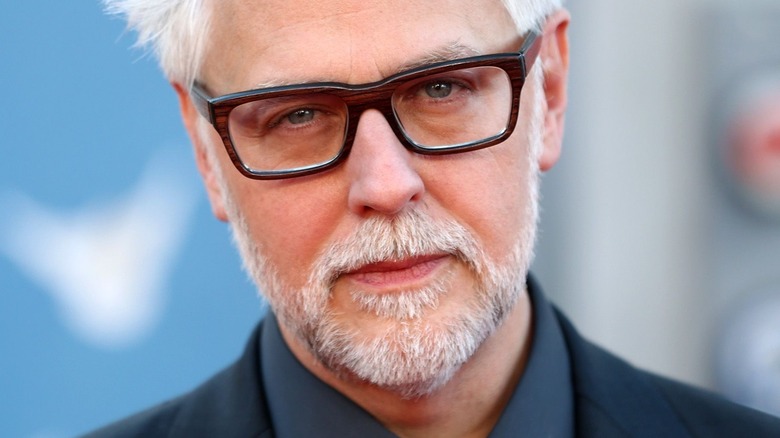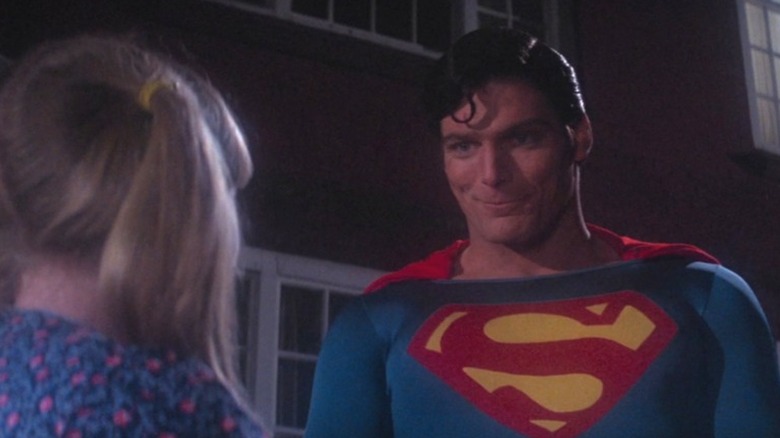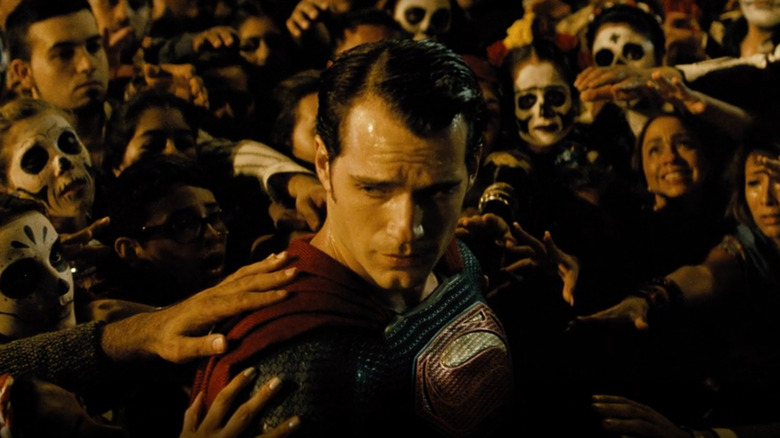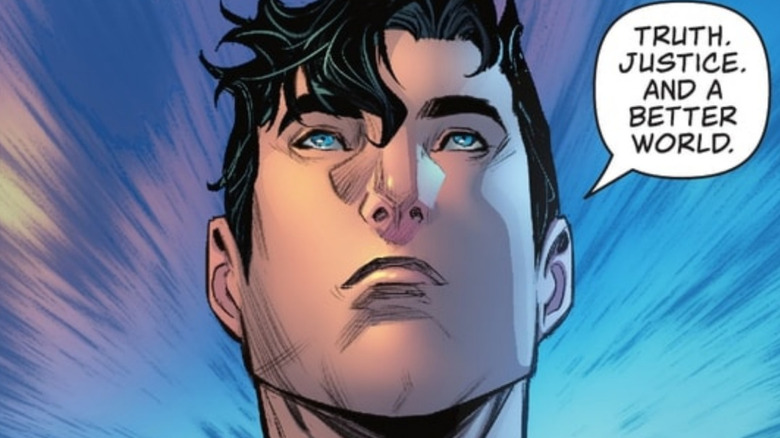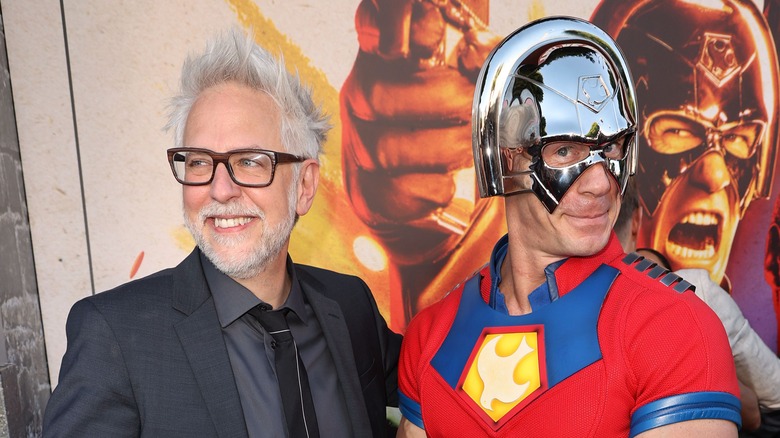James Gunn's Superman Reboot Needs To Stand Out From Its Predecessors In One Key Way
Henry Cavill may be out as Superman, but the iconic, golden-age hero won't be long gone from the silver screen, as new DC Studios co-head James Gunn has already hinted that he's got an all-star Superman story in mind. Despite the choppy waters at Warner, there are plenty of reasons to be optimistic about Gunn's take on Clark Kent. The director has already given fans several solid DC movies with "The Suicide Squad" and its HBO Max spin-off "Peacemaker." But he's a busy man, so to make his job a little easier, here's some advice to help Gunn make sure his "Superman" movie stands out from the pack of existing big-screen depictions of the Smallville hero.
Gunn's "Superman" reboot needs to return to the character's comic book roots while stepping away from the brutality, burdened spirit and misinterpreted biblicism of Zack Snyder's incarnation. But to truly stand out from all previous silver screen Sons of Krypton, DC's new film head needs to give us something deceptively simple: a true, 21st-century version of Kal-El who speaks to the current state of the world. And given the themes of his previous work, there's no one better suited to the task than Gunn.
Superman saves the cat
Let's start out with what previous "Superman" films got wrong. One thing Gunn must course correct after Snyder's run is Superman's personality. "Man of Steel" and subsequent films portrayed the Son of Krypton as a burdened hero who let his father die in a tornado because to do otherwise would expose his powers, then killed Zod (Michael Shannon). A morally conflicted Clark Kent isn't a bad decision, but the Superman fans who grew up reading comics would never let someone die, even for the greater good. Superman preserves life. If someone around him dies, it's despite his best efforts, and it's the guilt that weighs on him.
To be fair, there are some interesting Superman comic book storylines, such as "Injustice," that deal with the concept of a rogue Superman. Others, like "Red Son," ask what would have happened if Kal El landed not in Kansas but in Soviet Russia. And, of course, there's Frank Miller's "The Dark Knight Returns," which Snyder drew inspiration from (and largely misunderstood in) "Batman v Superman." But crucially, these are never prime timeline stories. They take place in other realities, so as not to sully the integrity of the main timeline Superman.
Superman's essential goodness can be summed up by a phrase that has become film writing 101: Save the cat. Christopher Reeve became the definitive Man of Tomorrow in the 1978 "Superman," effectively depicted as a hero who uses his nearly infinite power to do simple acts of heroism, encapsulated in the iconic scene where he rescues a girl's cat from a tree. This is one aspect of previous films that absolutely must return with Gunn's vision for the character.
Superman is Moses, not Jesus
Another thing the most recent films got wrong was their symbolic conception of Superman as a being with the power to destroy entire worlds, which leads to apocryphal interpretations of the character. Most egregious is Snyder's reliance on such imagery to portray the red-caped hero. Not only do his numerous visual comparisons to Jesus Christ cheapen "Man of Steel" and "Batman v Superman," they actively spit in the face of Clark Kent's origins.
Superman creators, writer Jerry Siegel and illustrator Joe Shuster, were born to Jewish immigrants, the former of whose parents fled antisemitism in Lithuania (via The Jewish-American Hall of Fame). In this context, Superman isn't Jesus, he's Moses, whose origins map onto Superman's almost perfectly. Moses: sent down the Nile River in a handbasket to save him from execution before being found and adopted by an Egyptian princess. Kal-el: sent away from Krypton to save him from its destruction and adopted by the Kents. Moses, to whom God appears in a burning bush and commands him to save his people. Kal-El, whose father appears to him in a holograph and instructs him to protect the people of Earth. In the Bible, Moses returns to confront the Pharaoh, much as Superman must eventually confront his childhood friend, Lex Luthor. Even the name Kal-El is derived from the Hebrew words kol, meaning voice, and El, meaning God, translating in English to "voice of God."
If Gunn truly understands who the character of Superman represented to a young Siegel, as well as to a generation of Jewish Americans, he would do well to lean into those origins. Superman has never been an explicitly Jewish character, nor does he have to be, but his oeuvre is imbued with those sentiments and hopes.
A modern world requires a modern Superman
Nearly a century after Siegel and Shuster put Superman in print, Gunn should respect their original intent, but he needs to recontextualize the Man of Tomorrow within the world we inhabit here and now. One known fact about Gunn's intentions for his "Superman" movie indicates he's on the right path, as he plans to focus on a young version of Supes (via IndieWire). That's a thrilling prospect and would absolutely set Gunn's movie apart if done correctly because what the character needs most is to be updated for the modern world. Superman cannot merely be in our world; he must be of it.
DC's comics division has already been hard at work doing just that for a couple of years. The "Son of Kal-El" storyline focuses on Jon Kent, Superman's child, as the title suggests. Jon is bisexual, and much of the story focuses on the younger Superman protecting Earth while coming to terms with his own identity, then coming out to Kal-El. Both characters are Superman at his best because, at his essence, Superman is an exploration of what heroism really means, whether that's in the process of defeating Darkseid-level threats or just being there for your son.
That's not to say Superman must necessarily be queer. However, defending vulnerable communities is as much a part of his ethos as saving the cat, and given the precarious state of human rights these days, a more vital aspect than ever. Gunn has already dealt with issues of bigotry in "Peacemaker," where the titular character (John Cena) is revealed to be bisexual and battles his racist, homophobic father. But that show is dripping with sarcasm and R-rated humor. The "Superman" movie is a chance for the director to make a sincerer statement.
Superman is the ultimate outsider, and that's Gunn's specialty
What makes Gunn a perfect director for "Superman" is his history of writing outsider characters. The connecting thread running through the director's work is the theme of outsiders and outcasts becoming connected to others and healing themselves through those bonds. As early as "Super," his first, twisted take on the superhero genre, Gunn was writing about people on the margins of society who form unlikely friendships. He refined that message in his "Guardians of the Galaxy" movies, and again in "The Suicide Squad" and "Peacemaker."
Gunn may need to soften his edge for a "Superman" movie, but the character fits that mold in every regard. Kal-El is the ultimate outsider, a literal alien among the Earthlings who eventually develops into their devoted protector. Imagine, if you will, a movie featuring a young Clark or Jon Kent. He knows he is different from those around him by virtue of (if nothing else) his powers, and this drives him into solitude. He has a deep, unwavering love of humanity, but fears they will never accept him because he has been rejected in the past by a former friend named Lex Luthor. However, he finds community among those on the margins of society, who take him in and teach him that being selflessly kind is always worth the risk. Armed with that understanding, he returns to Metropolis, where Luthor has risen to political power as a hate-mongering demagogue, to confront him once and for all.
Not only would such a story avoid the previous issues with "Superman" movies, but it would honor the character's long legacy while also setting Gunn's vision apart in a way that feels right at home with the rest of the director's filmography.
